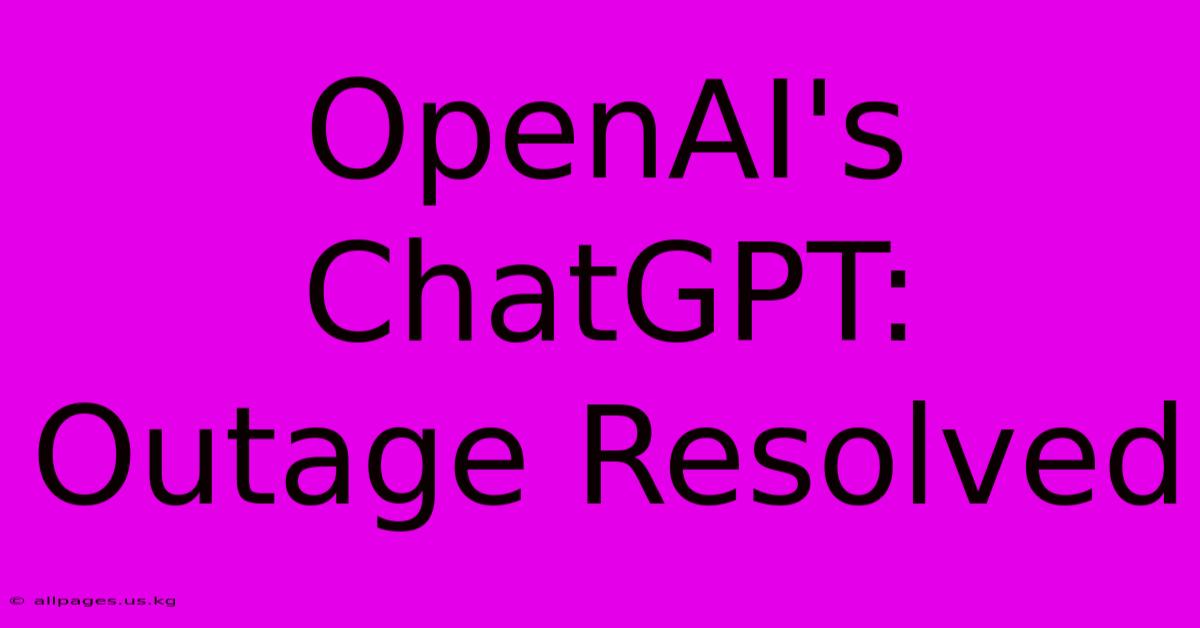OpenAI's ChatGPT: Outage Resolved

Discover more detailed and exciting information on our website. Click the link below to start your adventure: Visit Best Website allpages.us.kg. Don't miss out!
Table of Contents
OpenAI's ChatGPT: Outage Resolved – Back Online and Better Than Ever
OpenAI's popular AI chatbot, ChatGPT, recently experienced a service disruption, leaving users frustrated and unable to access the platform. However, the outage has now been resolved, and the service is back online. This article will delve into the details surrounding the outage, its impact, and what OpenAI has done to address the situation and prevent future disruptions.
Understanding the ChatGPT Outage
The recent ChatGPT outage caused significant inconvenience for millions of users worldwide. The exact cause of the outage wasn't immediately released by OpenAI, but initial reports suggested a potential surge in traffic or a backend infrastructure issue. Regardless of the root cause, the impact was widespread, with users reporting inability to log in, access conversations, or even reach the ChatGPT website.
The Impact of the Downtime
The downtime had several significant impacts:
- Disrupted workflows: Many users rely on ChatGPT for various tasks, including writing, coding, research, and creative endeavors. The outage interrupted these workflows, leading to delays and lost productivity.
- Negative user experience: The sudden inaccessibility led to frustration and negative sentiment among users who depended on the platform. This could potentially impact OpenAI's reputation and user loyalty.
- Lost revenue (potentially): If ChatGPT operates on a subscription or pay-per-use model (depending on the specific service tier), the outage likely resulted in lost revenue for OpenAI during the downtime.
OpenAI's Response and Resolution
OpenAI acknowledged the outage quickly and provided regular updates to its users through its social media channels and official website. The company's transparent communication helped manage user expectations and maintain a degree of trust. While the specifics of the technical fixes remain undisclosed, OpenAI likely deployed several strategies to restore service, including:
- Identifying and resolving the root cause: This likely involved a detailed analysis of their infrastructure logs and systems to pinpoint the exact source of the problem.
- Deploying emergency fixes: This could include deploying hotfixes, rolling back updates, or scaling up their infrastructure to handle the load.
- Implementing preventative measures: OpenAI undoubtedly took steps to prevent future occurrences of this nature, potentially involving upgrades to their infrastructure, improved monitoring, and better load-balancing strategies.
Lessons Learned and Future Implications
This outage serves as a reminder of the importance of robust infrastructure and disaster recovery planning for any online service, especially one as popular and widely used as ChatGPT. For OpenAI, the experience underscores the need for continued investment in infrastructure, redundancy, and proactive monitoring to minimize the impact of future outages.
The swift resolution, however, showcases OpenAI’s commitment to providing a reliable and dependable service. The incident highlights the crucial balance between rapid innovation and maintaining system stability. OpenAI’s proactive communication throughout the outage also played a significant role in mitigating the negative impact on user trust.
Moving Forward with ChatGPT
ChatGPT remains a powerful and versatile tool for a wide range of applications. While this outage was undoubtedly disruptive, OpenAI's rapid response and resolution demonstrate their commitment to providing a reliable service. Users can expect continued improvements and enhanced stability as OpenAI continues to refine its technology and infrastructure. The experience, while frustrating, has likely resulted in stronger and more resilient systems, ensuring a smoother user experience going forward.

Thank you for visiting our website wich cover about OpenAI's ChatGPT: Outage Resolved. We hope the information provided has been useful to you. Feel free to contact us if you have any questions or need further assistance. See you next time and dont miss to bookmark.
Featured Posts
-
Liverpool 3 1 Leicester Match Report
Dec 27, 2024
-
College Football Toledo Wins 6 Ot Battle
Dec 27, 2024
-
Pittsburgh Vs Toledo Game Above 2024 Line
Dec 27, 2024
-
11 Yard Sack Reed Vs Williams
Dec 27, 2024
-
Liverpool Title Salahs Feelings
Dec 27, 2024
